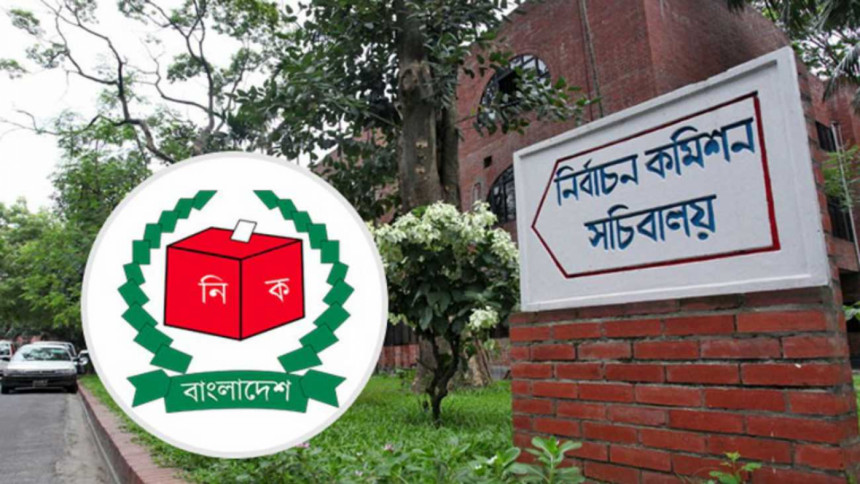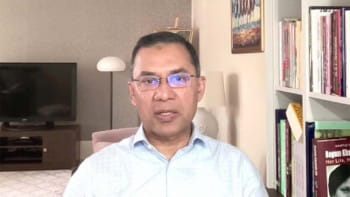Can the CEC take unilateral decisions?

On July 16, 2017, the Election Commission (EC) arranged a news conference to announce its electoral roadmap. According to a Prothom Alo report (July 17, 2017), when asked at the news conference about the recent transfer of EC officials due to the decisions of the Chief Election Commissioner (CEC) and the Secretary, ignoring other Commissioners, the CEC said, "Mr. Talukdar [Election Commissioner Mahbub Talukdar] knows this better. This is Mr. Talukdar's product." The CEC claimed that transferring officials is within the jurisdiction of the EC secretariat and there is no need to coordinate with the Commissioners in this matter. The Commissioners do not even have to know about it.
Article 118 of our Constitution mandates the creation of an independent EC. Article 119 specifies four functions for the EC: a. holding elections to the office of President; b. holding elections of members of parliament; c. preparing the electoral rolls; and d. delimiting the constituencies. The EC has the vast inherent power to carry out these functions. In Altaf Hussain vs Abul Kashem [45 DLR (AD)(1993)], the Bangladesh Supreme Court stated, "the Election Commission's inherent power under the provision of 'superintendence, control and direction' should be construed to mean the power to supplement the statutory rules with the sole purpose of ensuring free and fair elections."
In the past, the EC did not have a separate secretariat—its secretariat was part of the Prime Minister's secretariat. In response to the longstanding demands voiced by many of us, The Election Commission Secretariat Act, 2009 was enacted to create an independent secretariat for the EC to help it perform its responsibility of holding free and fair elections.
The EC's independent secretariat is created with a secretary and a group of other staff. To reduce its dependence on the government in conducting elections, a significant number of new staff were hired during the tenure of the Huda Commission (Dr Shamsul Huda). The purpose of such hiring was to help the Commission conduct free, fair and credible elections. Since all of the staff work for the Commission to this end, it is only natural that their appointments, transfers and promotions should be the jurisdiction of the Commission, consisting of five members.
Under Section 5 of The Election Commission Secretariat Act, it has been said that "the secretary shall be the administrative head of the Election Commission secretariat", with the responsibility of administration and control of all its staff, including the field staff. The secretary performs these roles to assist the Commission in conducting free and fair elections. Section 4(1) of the law clearly states, "The EC secretariat shall be responsible for providing all secretarial services to the Commission and it shall perform other responsibilities given to it by the Commission." It is thus clear that the Commission is the supervising authority of the secretariat and the secretary is accountable to the Commission.
The Election Commission Secretariat Act makes this accountability structure more unequivocal. Section 14(1) of the law states, "In performing all its responsibilities, the secretary shall be accountable to the Election Commission through the Chief Election Commissioner". In other words, the secretary is clearly made accountable to the Commission, although through the CEC. Thus, the CEC has no authority to make important decisions together with the secretary ignoring the Commission, which is a composite body [Jatiya Party vs Election Commission, 53 DLR (AD)(2001)].
In fact, the CEC cannot make any important decision at all without the authorisation of other Commissioners. According to Section 4 of The Representation of the People Order, 1972, "The Commission may authorise its chairman or any of its members or any of its officers to exercise and perform all or any of its powers and functions under this Order." In the Jatiya Party vs Election Commission case, our Supreme Court unequivocally stated that "for exercising and performing any powers and functions under this Order he (the CEC) must get authorisation from the Commission itself, otherwise his action ... would be coram non judice and without jurisdiction."
An Indian Supreme Court judgment more clearly demarcates the authority of the CEC. Readers may remember that the legendary T N Seshan was the lone Commissioner of the Indian Election Commission until 1993, when the government appointed two more Commissioners. The appointments were not acceptable to Seshan and a conflict arose within the Commission. Subsequently, Seshan and two other citizens filed writs before the court. Although the Indian Supreme Court in its interim order recognised the authority of the CEC over other Commissioners and allowed him to unilaterally give direction to the staff of the Commission, this was rescinded in the final judgment. In its final judgment, the Court stated, "The function of the Chairman would ... be to preside over meetings, preserve order, conduct the business of the day, ensure that precise decisions are taken and correctly recorded and do all that is necessary for smooth transaction of business ... He must so conduct himself at the meetings chaired by him that he is able to win the confidence of his colleagues on the Commission and carry them with him. This a Chairman may find difficult to achieve if he thinks that others who are members of the Commission are his subordinates. ... If the CEC is considered to be a superior in the sense that his word is final, he would render the ECs non-functional or ornamental."
To conclude, our EC is an independent constitutional body, and as such it is not directly accountable to any other institution. The Commission's accountability is to the people of Bangladesh and it is obliged to hold, on their behalf, free, fair, peaceful and credible elections. In the absence of an institutional accountability structure, the Commission has to function with the highest degree of transparency, accountability and sense of responsibility. That is what we expect from our Commission.
Dr. Badiul Alam Majumdar is Secretary, SHUJAN: Citizens for Good Governance.






Comments